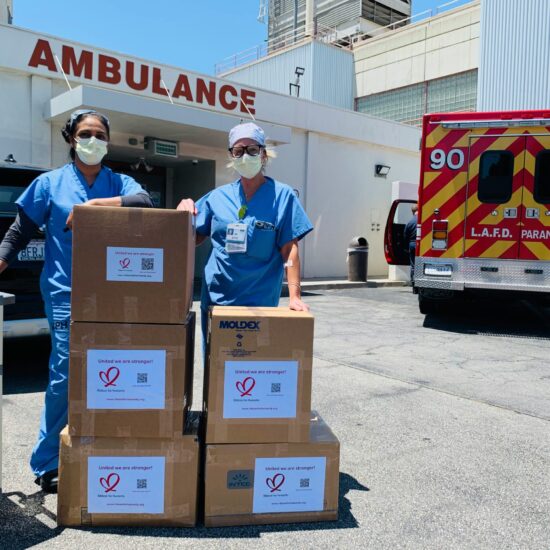Ann Campbell, RN-BC, MPH is a hospice nurse at an inpatient palliative and hospice care program in New York, and is currently an NP student at Hunter Bellevue School of Nursing. She is a research associate for the CHMP.
In nursing, we often joke about needing a feeding tube or urinary catheter ourselves. In the 14-hour workday we are often so focused on patient needs that sometimes it’s a luxury to take a break for food or even use the bathroom.
Every nurse I know wants to help people; patients and their loved ones know this from firsthand experience. However, nurses function within the confines of a system driven by economic, political, and legal forces. The challenge to turn caring into policy can seem insurmountable.
As a public health policy masters student at Columbia University, the topic of nurses in leadership positions triggered a memorable discussion. One classmate, when asked if she thought a nurse could become a CEO of a hospital or other health care organization, responded with a resounding “no.” Nurses lack the necessary clinical and leadership training, she argued. My classmate raised a provocative question; are nurses prepared to become leaders in the redesign of healthcare?
I believe that nurses are uniquely equipped to lead. In fact, a nurse now leads the Center for Medicare and Medicaid Services (CMS). And many others are CEOs of health care organizations.
Nurses must have the necessary tools and knowledge to influence this complex system. Obviously, the nursing role has evolved dramatically since the days of Florence Nightingale. Modern nursing education deeply involves sciences, and benefits from accomplished theorists and instructors. There are several masters’ level degrees that prepare nurses for clinical, administrative, and educational leadership. Moreover, two doctoral level advanced degrees are available: the research-focused PhD and the clinical leadership DNP.
The clinical leadership Doctor of Nursing Practice (DNP) coursework has been refined by evidence from the Institute of Medicine (IOM) reports: To Err is Human: Building a Safer Health System (1999), Crossing the Quality Chasm (2001), and Health Professions Education: A Bridge to Quality (2003). DNP clinicians are trained in health policy, scientific underpinnings of practice, organizational/systemic leadership, analytics, health information technology, and interdisciplinary collaboration. These tools can be utilized to produce quality healthcare delivery models.
Development of the DNP curriculum has been so effective that the American Association of Colleges of Nursing (AACN) took a position in 2004 recommending that all APNs be doctorally-prepared. While this is what AACN wanted, the plan will not go into effect by 2015.
Despite this progress, nurses must prepare for the challenges ahead. This includes caring for the 32 million newly insured patients with implementation of the Affordable Care Act over the next 10 years as well as a rapidly aging population. An estimated 1.2 million new nurses are needed by 2020. It also includes developing a strategy for changing the mindset of those who do not understand the leadership capacity of nurses.
The IOM report on the Future of Nursing sets forth clear goals for nurses to lead in this dynamic environment:
- Practice to the fullest extent of the scope of their education and training
- Achieve higher levels of education and training through an improved education system that provides seamless progression
- Provide opportunities for nurses to assume leadership positions and to serve as full partners in healthcare redesign and improvement efforts
- Improve data collection for more effective workforce planning, information infrastructure, and policymaking
The implications for practice, research, and advocacy are extensive. With the right education, nurses will lead innovative transformations in healthcare into the future.








Wade Schuette, MBA, MPH / October 23, 2012
I agree that nurses can become CEO’s and strong policy makers, but I’m not convinced that more academic credentials and socialization are causal, or in many cases even helpful, in reaching that goal.
I’m not picking on nursing programs. Even most MBA programs, which I’ve been in and taught in, are oriented to making more cookie-cutter middle-level managers, not to training actual leadership skills. The standing wisdom was that “the A students will go on to become faculty, and the B students, if any, will become the CEO’s.”
For that matter, I recall, when my then wife was an associate hospital administrator, the very rough transition where hospitals finally realized that not only did running a hospital NOT require an MD, but that most MD’s, despite their high self-esteem, were poor choices for CEO’s.
Did you know for example that the highest accident rate among pilots of small planes, second only to teenagers, is among MD’s? There’s a crucial insight hidden in that fact.
Academic values focus on publishing, careful precision regardless how long it takes, a legacy ethic valuing “great individuals” who “do their own work”, and in general are not focused on taking actual action in the real world, let alone dealing with large problems and risk-taking. I can’t imagine a doctoral faculty suggesting that “your topic is too narrow” or emphasizing breadth over depth.
Academics? A recent check at Oxford University, in the UK, which has been in business about a thousand years, showed that after 5 years of intense debate, they had still been unable to reach agreement on which e-mail system to use, and bankruptcy was a very real future for the institution. The whole point of the “ivory tower” was to shield people from “the real world.”
Hey, compare what you were taught at nursing school so far to how things are actually done, and how well existing staff respond to “But we were taught that it should be done this way!”
Business leadership, despite fluff stories in the press, is about putting together a great team, actually listening to them, and dealing day-after-day with huge problems that must be dealt with today, regardless how little you know about them — problems that come to you, not that you have carefully selected to be something you can accomplish alone in 2-3 years.
Yes, a leader should be able to tell good research and analysis from bad, but often wisdom is gained in a cybernetic loop by taking action, seeing if it worked or not, and learning from that. No amount of study will tell you what the real world is like in that quadrant in advance, and even if it could, it would take 8 years to accomplish and what you have is 8 hours.
Nurses have many skills and attitudes that can be leveraged into leadership positions, particularly a broad view of psychosocial factors that affect how people behave and make decisions, and an ability to empathize with others, and observe them closely. Nurses are very aware of the need for teams to provide care, not “great super-star individuals”, and aware that patients are injured more often by breakdown in teams than by lack of a super-star on site.
But I am not convinced that doctoral programs would strengthen the correct aspects of character. There is some disturbing evidence that innate clinical judgement skills actually decline during nursing school as people are trained to “be a good subservient follower.”
I might believe in a program for training CEO’s if it involved great internships, learning to fly a small plane, and possibly some para-military training in leadership, strategy, tactics, and victory. I’m working at developing virtual-reality training spaces where people can actually DO something and get some feedback. But the something doesn’t involve sitting at a desk, watching presentations, memorizing facts, or writing papers. It doesn’t involve skills that are easy to quantify, to teach, and to test people as individuals. Even most “group-work” in academia turns into thinly-veiled parallel play.
Henry Ford would never be considered leadership material. He simply didn’t have the necessary academic credentials. But he had something else.
It’s the something else we need to nurture in nurses. Practice interning at a nurse-owned and nurse-managed facility might help.
/
Wade Schuette, MBA, MPH / October 23, 2012
In fact, probably the way to learn how to run a business is to just jump in the water and run a business. Find a few other people, form an LLC, and try to sell a product, any product. Odds are it won’t work, but you’ll learn a lot from it. Then get a blank sheet of paper, fix what you did wrong last time, and form another LLC and try again. Odds are that won’t work either, but it will be way closer. Figure that by your third time, you’ll get it to work. Voila, you have CEO experience because you ARE one.
While you’re doing that, compare what you do on a daily basis to what they talk about and teach in “school”.
Nuff said.
/
annharpercampbell / October 23, 2012
Wade – I do agree with some of the points you made about experience. However, as a nurse having studied health policy and administration, the higher level understanding of politics, economics, and management have proven to be essential to my career. In order to advocate for patients, we must be able to shape the incentives that drive care. These are main tenants of the DNP program. You have earned your MBA and MPH, so I fail to understand why nurses wouldn’t benefit from the same.
Too often in the medical field, clinicians are handed administrative jobs without the proper background to be successful, even if they are able to manage the day to day. What this piece suggests, is that the doctorally prepared nurse clinician can now become fluent to the complex workings of the healthcare system. Then, I agree, getting some hands on experience to apply the newfound skills is a good idea. Internships and fellowships provide rich opportunities for learning by doing.
This brings up the second point, that nurses should be considered for these fellowships, board appointments, and opportunities to advocate for patients at the systemic level. Nurses have a unique role in the healthcare system, and deserve an equal voice.
/
Wade Schuette, MBA, MPH / October 24, 2012
Ann, I agree that there are some critical intellectual skills and understandings that a doctoral program might fill. My first wife, the mother of our 3 children, has an RN, a JD (law), a Masters of Hospital Administration, and a Doctor of Public Health degree. if it can be taught in school, she has learned it, or taught it, or written the definitive piece on it.
That said, she never learned crucial skills of acquiring and using influence and power in a self-sustaining and ever-increasing way. She has become, in layman’s terms “an academic.” The powers that be don’t need to be worried that she will ever rock their boat or rain on their parade.
I agree that there are skills and connections that a doctoral program can provide. But doctoral programs are not action oriented, and in most cases a program that does succeed in producing status-quo-shaking graduates will itself be soon attacked by the industries that prefer the status quo. After much hand-wringing, they will pull the teeth of the program and say “you can learn that afterwards, we only teach you safe things here that won’t get you in trouble.”
We have a very powerful forces that do not WANT Don Berwick wielding power, that want to eliminate AHRQ entirely.
To survive and thrive in that environment, nurses who intend to become serious leaders need something more, and something quite different, than what they will find in a doctoral program.
I don’t agree that such additional training should be, or can be, put off until “after you finish the degree program.” That’s too late. The degree program should be secondary, and primary should be field training in the skills and attitudes and concepts and networks of how to acquire and wield power, without losing your soul or your main reason for going there.
It’s hard not to notice that there are many people these days featured on the front page who not only are not in charge of a deep understanding of facts and relations, but who actually seem to have general contempt for facts. In the world as perceived by academia, these people would never make it to first base. In the real world, these people are taking over the reins of the world and determining the rules of the world we and our children will live in.
We have a lot of academics. We have walls full of “studies”. It’s not enough. Generating another 100,000 of them will not fix things.
I’m not trying to be cynical here — I’m trying to be much more aggressive at questioning exactly what it is that is between nurses today and successful world-transformers tomorrow and not accepting academia’s promise as either obvious or a “given.”
I want to see metrics that measure influence and power and outcomes, not test-scores and check-lists and inputs. I want to see alumni organizations that are true power organizations that shape the doctoral programs to create the missing leaders they need.
I don’t see those things yet. I see “more of the same.” Great students, like great patients, will be a massive pain to manage because they will have, and will insist on asserting, a will of their own. They’ll see bad practices and refuse to go along with them “for now.”
And worse, they’ll end up yet another $50,000 or more in debt, with pressures to conform and take a job in “the system” in order to pay off their student loans, “just until those are paid off, and THEN I will do my own thing.”
Every nurse-commander should have to start her own LLC the first month of the program and practice being a CEO and hanging out with other CEO’s of small companies (at first) and transforming her self-image. By graduation, every nurse should be running a successful business that she can sell, or expand, or move on from — a business that focuses her learning on those things that help her business succeed.
That would be a CEO-training program I could believe in, and one that could be financially self-sustaining because the graduates would be assured not just “jobs” but CEO jobs, and would use the program to search for new employees to bring into the family.
Personally, I think they should all be required to enroll in a private-pilot program, and get a license by the time they graduate. It’s a useful thing to know as a CEO, and there are attitudes towards life that come with the territory, largest of which is literally “the buck stops here.” You master the skills, or you and your passengers die. Period. it’s focusing. And it’s confidence building, and justifiably so.
There should be combat practice of some kind at some metaphorical level, possibly in virtual reality scenarios. Practice “winning a meeting”. Practice negotiating. Muscle and confidence building practice. Practice meeting a payroll. Practice dealing with difficult Board members.
Such practical skills tend to be difficult to work into academic programs. They are so … lowering, befitting the masses, not something that the academic credential program committee wants to see, knows themselves how to do (or they would be out doing them), or knows how to measure.
In fact, it will be extremely difficult to measure how a great leader accomplishes her goals. Everyone will know that she was somehow involved in the company succeeding, but they will be at a loss to point out exactly how it was she did that, because their own role was so rewarded and appreciated and gently nudged and guided to mesh in with others.
And besides, academic credit is about doing clearly measurable cognitive work that is clearly “your own”, not about successful teamwork and running a profitable company as a CEO.
I WANT nurses to succeed. I want programs to succeed. I remain skeptical that doctoral programs, if left to their own normal pathways, will produce that result.
/